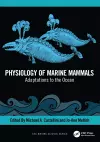
Physiology of Marine Mammals
2 contributors - Paperback
£53.99
Michael Castellini earned his PhD from the Scripps Institution of Oceanography and was a faculty member at the University of Alaska Fairbanks (UAF) from 1989-2021. Now an Emeritus Professor, he was the founding Science Director for the Alaska SeaLife Center, the Director of the Institute of Marine Science at UAF, Dean for the School of Fisheries and Ocean Sciences and Dean for the UAF Graduate School, senior faculty in the Center for Arctic Policy Studies and director of the Center for Global change. Dr. Castellini’s research focuses on how marine mammals have live in the sea, including their biochemical, physiological and behavioral adaptation for deep and long-duration diving, extended fasting, exercise physiology, hydrodynamics, and sleeping patterns. In Alaska, his work has extended into issues of population health, contaminant chemistry, protein metabolism and digestive physiology. Dr Castellini’s graduate students have worked from Alaska to Antarctica on these issues. He has written more than 100 scientific papers and chapters, and was involved in local, state, and national committees dealing with policy issues related to marine mammals, ecosystem management and polar concerns. He continues to provide guest lectures and assistance on local and national issues related to marine mammal biology.
Jo-Ann Mellish, PhD, earned her PhD from Dalhousie University in Canada and was jointly-appointed research faculty at UAF and scientist at the Alaska SeaLife Center from 2001-2016. She now facilitates funding opportunities for other scientists in her role of Program Manager and Chief Grants and Operations Officer at the North Pacific Research Board. In a similar path to Mike, her dean for many years, her field studies on marine mammal energetics, thermoregulation, body condition, predation and survival have allowed her to adventure from pole to pole. In Alaska, she focused on innovative approaches to studying physiology, survival and predation in endangered species, working to raise the bar on thoughtful assessments of the research procedures themselves. In Antarctica, she worked with a highly collaborative team of researchers that melded physiology, ecology and modeling to understand the potential impacts of climate change in highly adapted cold environment species. Her work has resulted in more than 40 scientific papers.